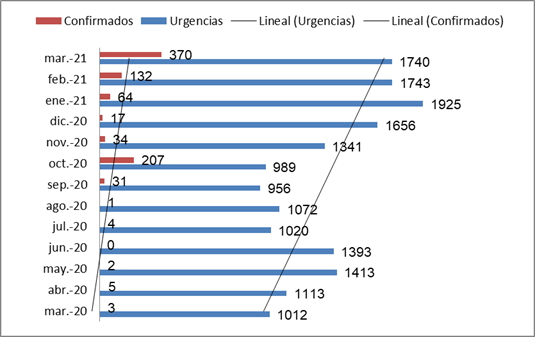My SciELO
Services on Demand
Journal
Article
Indicators
-
 Cited by SciELO
Cited by SciELO
Related links
-
 Similars in
SciELO
Similars in
SciELO
Share
Gaceta Médica Espirituana
On-line version ISSN 1608-8921
Gac Méd Espirit vol.23 no.3 Sancti Spíritus Sept.-Dec. 2021 Epub Dec 03, 2021
Editorial
Covid-19 and its impact on dental care in Sancti Spíritus
1Clínica Estomatológica Provincial de Sancti Spíritus, Sancti Spíritus, Cuba.
2Centro Provincial de Higiene y Epidemiología de Sancti Spíritus, Sancti Spíritus, Cuba.
Since the first cases of patients affected by Covid-19 appeared in Cuba in March 2020, specifically in Sancti Spíritus province, dental care has become a health problem for both, patients and professionals from this field; for this reason, on March 24, 2020, José Ángel Portal Miranda, Minister of Public Health, informed that Cuba was reorganizing its medical services versus Covid-19 to avoid an unnecessary flood of people to health institutions and without exposing at risk the lives of more than 11 million inhabitants of the island, he proposed the need to stop dental services, except for emergencies, and to maintain them in isolation places, even though this would imply a high risk. 1
In this context, professionals had to adapt quickly to the new work demands and face the growing number of patients that required an efficient clinical practice without affecting their health, taking into account that among the health personnel, stomatologists are one of the most exposed to the disease, because their object of study and work is the mouth (a site for infection). Likewise, scientific evidence shows that Covid-19 is transmitted in three main ways: contact (direct or indirect), in droplets and in aerosol form. 2 Stomatologists who are in direct patient care are exposed to a high risk by any of these ways of transmission.
Sancti Spíritus Provincial and Teaching Dental Care Clinic became one of the focal places in this city for dental emergencies. An analysis of all statistical reports from March 2020 to March 2021 was conducted, which reflected the number of patients who needed dental care services during this period. Data report related to the patients care with dental care emergencies in the specialties of Comprehensive Dental Care (CDC), Periodontics, Prosthetics and Orthodontics was analyzed, as well as the total number of professionals who worked during the pandemic period.
Out of the total number of professionals, specialists in Comprehensive Dental care predominated and were, themselves, those who reported the highest number of emergencies. All this possibly because in that dental care services the number of specialists is superior, and their proportion per dental unit is higher than in other specialties.
A total of 17627 patients in all specialties were attended, 17373 of them corresponded to the CDC service and in 13180 Natural and Traditional Medicine (NTM) was used as an alternative treatment.
When analyzing the statistics for this stage, the most frequent code reported by stomatologists in emergency patient care was 6.4, which corresponds to the temporary sealing of cavities, maybe due to caries toothache, caries recurrence, displaced or fractured restorations.
On consulting the internet literature on emergency care in pandemic times, it was observed that toothache was the predominant cause in patients requiring care during this period. 3,4
Chart 1 shows a similar trend of increasing dental emergency care and confirmed cases of Covid-19 in Sancti Spíritus municipality from March 2020 to March 2021. The reasons for this might be, despite the specific mobility restrictions of this stage, dental care was maintained, also the culture of the Cuban population to systematically pursue these health services. (Chart 1).

Chart 1 Attention to dental emergencies and Covid-19 cases confirmed in Sancti Spíritus municipality.
Every patient is considered as potentially infected by the virus, all dental care practices must be done with proper disinfection and infection control protocols, without these, is better to avoid any care. Oral medicine has moved from a stage of great clinical development to a stage where the protective barrier management, treatment management and patient time allocation will change the way the profession is conducted. 5
It is considered that current circumstances will be existing for a long time, so it is suggested to continue emergency and urgent care in all health care units in each health area and to elect a referral site in each territory for comprehensive dental care, as well as to solve dental care problems gradually.
Dental care versus the pandemic, should give priority to succeeding recommendations and guidelines issued by national and international entities, in order to provide safe and quality clinical dental care focused on each patient´s well-being.
REFERENCIAS BIBLIOGRÁFICAS
1. Corbillón Díaz E. Cuba reorganiza sus servicios médicos ante la COVID-19 [Internet]. [Publicado 24 Mar 2020; citado 02 Feb 2021]. Disponible en: Disponible en: http://www.acn.cu/salud/62465-cuba-reorganiza-sus-servicios-medicos-ante-la-covid-19 [ Links ]
2. Espinosa-Brito A. Reflexiones a propósito de la pandemia de COVID-19: del 18 de marzo al 2 de abril de 2020. Anales de la Academia de Ciencias de Cuba [Internet]. 2020 [citado 18 May 2021];10(2). Disponible en: Disponible en: http://www.revistaccuba.cu/index.php/revacc/article/view/765/802 [ Links ]
3. González Espangler L, Lafargue Gainza F, Borges Toirac MA, Romero García LI. La atención a pacientes con problemas bucales durante la COVID-19: un reto para los profesionales del sector de la salud. Medisan [Internet]. 2020 [citado 18 May 2021];24(4):593-609. Disponible en: Disponible en: http://scielo.sld.cu/pdf/san/v24n4/1029-3019-san-24-04-593.pdf [ Links ]
4. Herrero-Solano Y, Zamabrano-Gómez V, Arias-Molina Y, Pérez-Milán A, Ramírez-Menéndez S. Urgencias estomatológicas atendidas en una clínica de Bayamo, durante la situación epidemiológica causada por la COVID-19. Rev Electrónica Dr. Zoilo E. Marinello Vidaurreta [Internet]. 2020 [citado 5 May 2021];45(5). Disponible en: Disponible en: http://revzoilomarinello.sld.cu/index.php/zmv/article/view/2360/pdf_705 [ Links ]
5. Sigua-Rodríguez EA, Bernal-Pérez JL, Lanata-Flores AG, Sánchez-Romero C, Rodríguez-Chessa J, Haidar Ziyad S, et al. COVID-19 y la Odontología: una Revisión de las Recomendaciones y Perspectivas para Latinoamérica. Int J Odontostomat [Internet]. 2020 [citado 16 May 2021];4(3):299-309. Disponible en: Disponible en: https://scielo.conicyt.cl/pdf/ijodontos/v14n3/0718-381X-ijodontos-14-03-299.pdf [ Links ]
Received: August 20, 2021; Accepted: October 29, 2021











 text in
text in 



